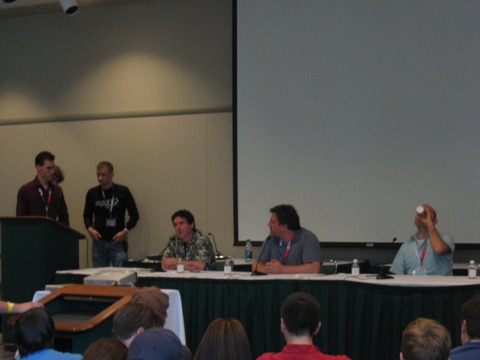PAX '07: It's all about the story
Monkey Island creators join Sly Cooper vet to dish on the challenges and opportunities associated with incorporating worthwhile narratives into interactive entertainment.
SEATTLE--One of the primary driving factors in the games industry has been technology. The current console climate has made huge strides in this most recent generation in providing immersive environments, intense action sequences, and highly detailed graphics and character models. However, technology has also presented a unique opportunity in one of the hallmark areas of potential in gaming: storytelling.

Kicking off the panel circuit at this year's Penny Arcade Expo is "Once Upon a Time...Storytelling in Games Today," which set out to explore the challenges presented by storytelling in games, as well as the unprecedented opportunity to convey a story through the interactive gaming medium.
Speaking at the Q&A-oriented session were three of the more prolific names in the industry. Dave Grossman, currently with Telltale Games, is the writer of the universally acclaimed adventure game series The Secret of Monkey Island, as well as Day of the Tentacle. Also of Monkey Island fame, and currently working with Hothead games on Penny Arcade Adventures: On the Rain-Slick Precipice of Darkness, is Ron Gilbert. Lastly, Nate Fox has worked with Sucker Punch on the well-liked Sly Cooper series of stealth platformers.
Getting the ball rolling, the three addressed the problems associated with telling a story through a game. Opining first, Grossman noted that there's a serious disconnect between narrative and gameplay, and therefore designers lose control of a lot of important aspects of storytelling. He continued, saying that pace and context are extremely important in developing a story, and these elements can aggravate players more interested in a linear style of play. Gilbert expounded on this further, stating that the difference between movies and games is that gamers can and will do everything in their power to mess up the designer's intended purpose. Consequently, game designers must incorporate into the story certain eventualities that players happen upon through creative gameplay.
Continuing with the association between movie storytelling and game storytelling, the three universally agreed that games are far easier to get emotionally attached to. According to Grossman, you have more buy-in with a game. After all, when you spend five or 10 hours building up a character in a role-playing game, and then that character dies, players want to punch a hole through their monitors. On the other hand, when a character in a movie dies, often the response becomes, "I totally saw that coming." Fox followed, noting that it is far easier to explore a situation in a game than a movie. Therefore, it is possible to incorporate more diverse viewpoints or takes on a situation.
The panel then shifted to how important the story is in designing a game. Here the panel split, with Fox stating that in his games, story is often shoehorned in after the game mechanics have been established. After all, he said, it isn't possible to know what a character will be until it is known what a character can do. Not parsing words, Gilbert rebutted Fox's approach to story implementation with a terse "Nate's wrong." However, he followed that statement by saying that different people have different methodologies, and Fox's methods clearly work for him.
The panel was then asked for their thoughts on the decline of the adventure game genre as a whole. Grossman summed up his cohorts' thoughts by saying that adventure games are very tricky, because it is easy to do them poorly. As opposed to a first-person shooter or action game, there is no middle ground with an adventure game: It is either solid or it is unbearable. According to Grossman, a lot of that has to do with finding the sweet spot on the puzzle elements, given that audiences will quickly grow bored if the puzzles are too easy, yet are just as quick to give up if the puzzles are too difficult.
A second obstacle to the wide appeal of adventure games noted by the panel is that it is far more difficult to create tension than in fast-paced shooters or action games. As Grossman put it, adventure games are in many ways like reading a book due to their relative lack of gameplay. Accordingly, instead of a visceral tension, adventure games provide intellectual tension, which is increased, according to Grossman, by having the player juggle an increasing amount of information.
Got a news tip or want to contact us directly? Email news@gamespot.com
Join the conversation